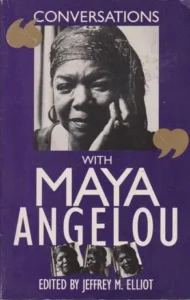Maya Angelou on Courage and Facing Evil
INSPIRATIONAL, 21 Oct 2024
Maria Popova | The Marginalian – TRANSCEND Media Service
 In 1982, nearly a decade after their spectacular conversation about freedom, beloved poet, memoirist, dramatist, actor, producer, filmmaker, and civil rights activist Maya Angelou (April 4, 1928–May 28, 2014) and celebrated interviewer Bill Moyers traveled together to the beautiful Texas countryside to discuss the ugliest aspects of human nature at a conference titled Facing Evil. It was a subject with which Angelou, the survivor of childhood rape and courageous withstander of lifelong racism, was intimately acquainted. In a recent remembrance of his friend, Moyers shares excerpts from the 1988 documentary about the event and reflects on the timeless goodness of her spirit.
In 1982, nearly a decade after their spectacular conversation about freedom, beloved poet, memoirist, dramatist, actor, producer, filmmaker, and civil rights activist Maya Angelou (April 4, 1928–May 28, 2014) and celebrated interviewer Bill Moyers traveled together to the beautiful Texas countryside to discuss the ugliest aspects of human nature at a conference titled Facing Evil. It was a subject with which Angelou, the survivor of childhood rape and courageous withstander of lifelong racism, was intimately acquainted. In a recent remembrance of his friend, Moyers shares excerpts from the 1988 documentary about the event and reflects on the timeless goodness of her spirit.
Transcribed Highlights
On the history of evil:
Throughout our nervous history, we have constructed pyramidic towers of evil, ofttimes in the name of good. Our greed, fear and lasciviousness have enabled us to murder our poets, who are ourselves, to castigate our priests, who are ourselves. The lists of our subversions of the good stretch from before recorded history to this moment. We drop our eyes at the mention of the bloody, torturous Inquisition. Our shoulders sag at the thoughts of African slaves lying spoon-fashion in the filthy hatches of slave-ships, and the subsequent auction blocks upon which were built great fortunes in our country. We turn our heads in bitter shame at the remembrance of Dachau and the other gas ovens, where millions of ourselves were murdered by millions of ourselves. As soon as we are reminded of our actions, more often than not we spend incredible energy trying to forget what we’ve just been reminded of.
And yet Angelou was nothing if not a champion of the human spirit and its highest potentiality for good. She reflects on how refusing to speak for five years after being raped as a child (“I won’t say severely raped; all rape is severe,” Angelou notes in one of her characteristically piercing asides) shaped her journey:
To show you … how out of evil there can come good, in those five years I read every book in the black school library. I read all the books I could get from the white school library. I memorized James Weldon Johnson, Paul Laurence Dunbar, Countee Cullen and Langston Hughes. I memorized Shakespeare, whole plays, fifty sonnets. I memorized Edgar Allen Poe, all the poetry — never having heard it, I memorized it. I had Longfellow, I had Guy de Maupassant, I had Balzac, Rudyard Kipling — I mean, it was catholic kind of reading, and catholic kind of storing.
[…]
Out of this evil, which was a dire kind of evil, because rape on the body of a young person more often than not introduces cynicism, and there is nothing quite so tragic as a young cynic, because it means the person has gone from knowing nothing to believing nothing. In my case I was saved in that muteness… And I was able to draw from human thought, human disappointments and triumphs, enough to triumph myself.
Angelou’s most soul-expanding point is that courage — something she not only embodied but also championed beautifully in her children’s book illustrated by Basquiat — is our indelible individual capacity and our shared existential responsibility:
We need the courage to create ourselves daily, to be bodacious enough to create ourselves daily — as Christians, as Jews, as Muslims, as thinking, caring, laughing, loving human beings. I think that the courage to confront evil and turn it by dint of will into something applicable to the development of our evolution, individually and collectively, is exciting, honorable.
For more of Angelou’s remarkable spirit, revisit her 1973 conversation with Moyers, her moving letter to her younger self, and her timeless meditations on home and belonging and identity and the meaning of life.
_______________________________________
 My name is Maria Popova — a reader, a wonderer, and a lover of reality who makes sense of the world and herself through the essential inner dialogue that is the act of writing. The Marginalian (which bore the unbearable name Brain Pickings for its first 15 years) is my one-woman labor of love, exploring what it means to live a decent, inspired, substantive life of purpose and gladness. Founded in 2006 as a weekly email to seven friends, eventually brought online and now included in the Library of Congress permanent web archive, it is a record of my own becoming as a person — intellectually, creatively, spiritually, poetically — drawn from my extended marginalia on the search for meaning across literature, science, art, philosophy, and the various other tendrils of human thought and feeling. A private inquiry irradiated by the ultimate question, the great quickening of wonderment that binds us all: What is all this? (More…)
My name is Maria Popova — a reader, a wonderer, and a lover of reality who makes sense of the world and herself through the essential inner dialogue that is the act of writing. The Marginalian (which bore the unbearable name Brain Pickings for its first 15 years) is my one-woman labor of love, exploring what it means to live a decent, inspired, substantive life of purpose and gladness. Founded in 2006 as a weekly email to seven friends, eventually brought online and now included in the Library of Congress permanent web archive, it is a record of my own becoming as a person — intellectually, creatively, spiritually, poetically — drawn from my extended marginalia on the search for meaning across literature, science, art, philosophy, and the various other tendrils of human thought and feeling. A private inquiry irradiated by the ultimate question, the great quickening of wonderment that binds us all: What is all this? (More…)
Go to Original – themarginalian.org
Tags: Evil, Inspirational, Life, Literature, Love, Maya Angelou, Wisdom
DISCLAIMER: The statements, views and opinions expressed in pieces republished here are solely those of the authors and do not necessarily represent those of TMS. In accordance with title 17 U.S.C. section 107, this material is distributed without profit to those who have expressed a prior interest in receiving the included information for research and educational purposes. TMS has no affiliation whatsoever with the originator of this article nor is TMS endorsed or sponsored by the originator. “GO TO ORIGINAL” links are provided as a convenience to our readers and allow for verification of authenticity. However, as originating pages are often updated by their originating host sites, the versions posted may not match the versions our readers view when clicking the “GO TO ORIGINAL” links. This site contains copyrighted material the use of which has not always been specifically authorized by the copyright owner. We are making such material available in our efforts to advance understanding of environmental, political, human rights, economic, democracy, scientific, and social justice issues, etc. We believe this constitutes a ‘fair use’ of any such copyrighted material as provided for in section 107 of the US Copyright Law. In accordance with Title 17 U.S.C. Section 107, the material on this site is distributed without profit to those who have expressed a prior interest in receiving the included information for research and educational purposes. For more information go to: http://www.law.cornell.edu/uscode/17/107.shtml. If you wish to use copyrighted material from this site for purposes of your own that go beyond ‘fair use’, you must obtain permission from the copyright owner.